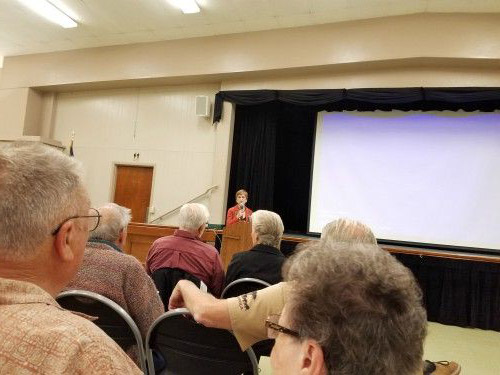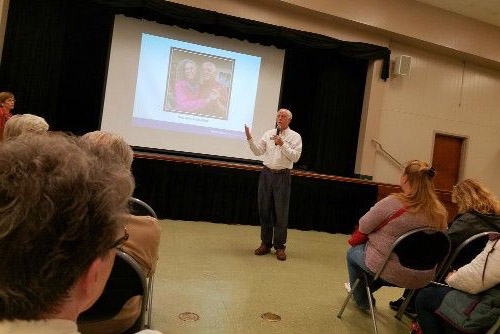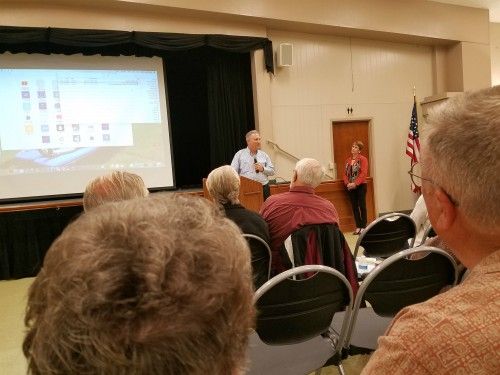"Someone I Know Has Dementia. How Can I Help" Workshop | St. Irenaeus
"Someone I Know Has Dementia. How Can I Help" Workshop
by Rosemary Lewallen
 About 85 people attended a free workshop on how to help someone who has dementia held May 21st at St. Irenaeus Parish Hall. It began with a welcome and prayer by Monica Kovach, Facilitator of Health Ministry, St. Irenaeus Catholic Church. Then Kari Walker, Director of Education at Alzheimer's Orange County spoke about memory loss. She asked, "If any of the women in the audience noticed a lump in their breast, would they contact a doctor?" The answer was, "Yes". Then she asked, "What if you noticed that you have memory problems?" Her point was that many people don't ask their physicians about memory loss because there is a stigma associated with having dementia. We need to reduce the stigma of this disease and increase empathy. Unlike seeing someone with a cast on their foot who you can understand needs physical assistance in an emergency, dementia is not obvious and we don't often know what help is needed. If we can see that someone has a physical problem, we adjust our expectations, but we don't always "see" all of the problems that someone with dementia has. It is very important that we learn more about this disease and "walk in the shoes" of those who are afflicted with this disease. Understanding will enhance the empathy and compassion needed for caregiving.
About 85 people attended a free workshop on how to help someone who has dementia held May 21st at St. Irenaeus Parish Hall. It began with a welcome and prayer by Monica Kovach, Facilitator of Health Ministry, St. Irenaeus Catholic Church. Then Kari Walker, Director of Education at Alzheimer's Orange County spoke about memory loss. She asked, "If any of the women in the audience noticed a lump in their breast, would they contact a doctor?" The answer was, "Yes". Then she asked, "What if you noticed that you have memory problems?" Her point was that many people don't ask their physicians about memory loss because there is a stigma associated with having dementia. We need to reduce the stigma of this disease and increase empathy. Unlike seeing someone with a cast on their foot who you can understand needs physical assistance in an emergency, dementia is not obvious and we don't often know what help is needed. If we can see that someone has a physical problem, we adjust our expectations, but we don't always "see" all of the problems that someone with dementia has. It is very important that we learn more about this disease and "walk in the shoes" of those who are afflicted with this disease. Understanding will enhance the empathy and compassion needed for caregiving.
A video was shown about how we in faith based communities can support someone in our congregation who has memory loss. If you notice that someone is having problems attending services, has a change in mood or personality, pay attention to their body language. Greet them warmly at services. Tell them your name. Consider becoming their "worship friend". If they act out, try redirecting them to another area in a calm and non-judgmental manner.
Alzheimer's Disease affects one out of ten people over the age of 65. It is an incurable disease that starts in the hippocampus and slowly moves to other parts of the brain. This disease progresses over a period that can vary from two to 20 years with increasing plaques and tangles in the brain that destroy memory and kill brain cells. Symptoms of Alzheimer's Disease begin with memory loss. As the disease progresses, it adversely affects language ability, regulation of emotions, sensory perception (may include hallucinations), balance, coordination, and, lastly, the regulation of breathing and heart beating.
 The next speaker was Ben Allen, Coordinator of the art program, Memories in the Making at Alzheimer's Orange County. Ben's wife, Judy, was diagnosed with Alzheimer's Disease nine years ago. He immediately contacted the Alzheimer's Orange County, joined a support group and took advantage of other resources available through Alzheimer's Orange County. His purpose is to help her be content for maybe 15 minutes or an hour each day by connecting with her in a special way, such as dancing cheek to cheek. Ben was his wife's primary caregiver for five years. The last four years Judy has been in a long-term care facility. He sees her daily and she still knows who he is. Ben talked about how we relate to our loved ones who have this disease. He advised those most directly affected by this disease to join a support group. There are many types of support groups available in Orange County: some are for people in the early stage of the disease where both the caregiver and the patient go together; others are available in various languages; some are for only men or for only women. There is a 24-hour free hotline at 844-HELP-ALZ (844-435-7259) where social workers can answer almost any question.
The next speaker was Ben Allen, Coordinator of the art program, Memories in the Making at Alzheimer's Orange County. Ben's wife, Judy, was diagnosed with Alzheimer's Disease nine years ago. He immediately contacted the Alzheimer's Orange County, joined a support group and took advantage of other resources available through Alzheimer's Orange County. His purpose is to help her be content for maybe 15 minutes or an hour each day by connecting with her in a special way, such as dancing cheek to cheek. Ben was his wife's primary caregiver for five years. The last four years Judy has been in a long-term care facility. He sees her daily and she still knows who he is. Ben talked about how we relate to our loved ones who have this disease. He advised those most directly affected by this disease to join a support group. There are many types of support groups available in Orange County: some are for people in the early stage of the disease where both the caregiver and the patient go together; others are available in various languages; some are for only men or for only women. There is a 24-hour free hotline at 844-HELP-ALZ (844-435-7259) where social workers can answer almost any question.
It is also important to educate yourself about this disease. Alzheimer's Orange County has a printed calendar of educational programs and workshops that can be found on their website. Education leads to compassion for your loved one with dementia and is key to connecting with them. Learning about their limitations will help you be more understanding of their situation, promoting empathetic caregiving. Ben gave the example that his wife had confusion with mirrors. She could not understand that she was the person in the mirror and she became paranoid that this person was stealing her things. She also has a lack of depth perception and peripheral vision that resulted in several falls. People with this disease cannot grasp the passing of time, have difficulty seeing color contrasts and experience visual distortion. We cannot change the way that they see the world, but we can try to understand them so that we can connect with them. Alzheimer's Orange County offers a unique program known as Connect2Culture, which provides many social activities that help to stimulate those with the disease and reduce isolation, as well as resources for caregivers and a support network.
Ben stressed that caregivers need to take care of themselves so that they are able to help their loved ones. Sometimes it is hardest to have patience with those people who are closest to us, especially when we are sleep deprived or our own health is compromised. Our loved ones with this disease cannot remember the past ways of doing things, which is frustrating both to them and to their caregivers. Taking care of our own health allows us to be better prepared to help others.
One of the common questions is, "What is the difference between dementia and Alzheimer's Disease?". Dementia refers to the symptoms, such as, cognitive loss, loss of logic and abstract thinking. Dementia is the umbrella term that includes several causes of these symptoms. Alzheimer's Disease is the number one cause of dementia, comprising 60-75% of dementia cases.
 Next, Vernon Atwood, co-owner of Right at Home in Cypress, an in-home care provider, spoke about "Dementia Live". This is a program that allows people to "walk in the shoes" of someone with dementia by creating a simulation that helps you experience their impaired sensory perception. This one hour program will be offered at St. Irenaeus Parish Hall on three dates: June 2nd from noon to 1 p.m.; June 4th from 7 to 8 p.m. and June 9th from 9 to 10 a.m., 12 to 1 p.m. and 3 to 4 p.m. If these times do not work for you, Vern may arrange a home visit. The goal is to increase understanding and empathy in caregivers so that they can better connect with the person who has dementia by communicating more effectively and creating a dementia-friendly environment. We were asked to compassionately respond to the emotion of the patient, not try to explain or argue with the person. Sign-ups for Dementia Live from Age-u-cate training followed the presentation.
Next, Vernon Atwood, co-owner of Right at Home in Cypress, an in-home care provider, spoke about "Dementia Live". This is a program that allows people to "walk in the shoes" of someone with dementia by creating a simulation that helps you experience their impaired sensory perception. This one hour program will be offered at St. Irenaeus Parish Hall on three dates: June 2nd from noon to 1 p.m.; June 4th from 7 to 8 p.m. and June 9th from 9 to 10 a.m., 12 to 1 p.m. and 3 to 4 p.m. If these times do not work for you, Vern may arrange a home visit. The goal is to increase understanding and empathy in caregivers so that they can better connect with the person who has dementia by communicating more effectively and creating a dementia-friendly environment. We were asked to compassionately respond to the emotion of the patient, not try to explain or argue with the person. Sign-ups for Dementia Live from Age-u-cate training followed the presentation.
If you have any questions, please contact Monica Kovach at 310-490-6113.



